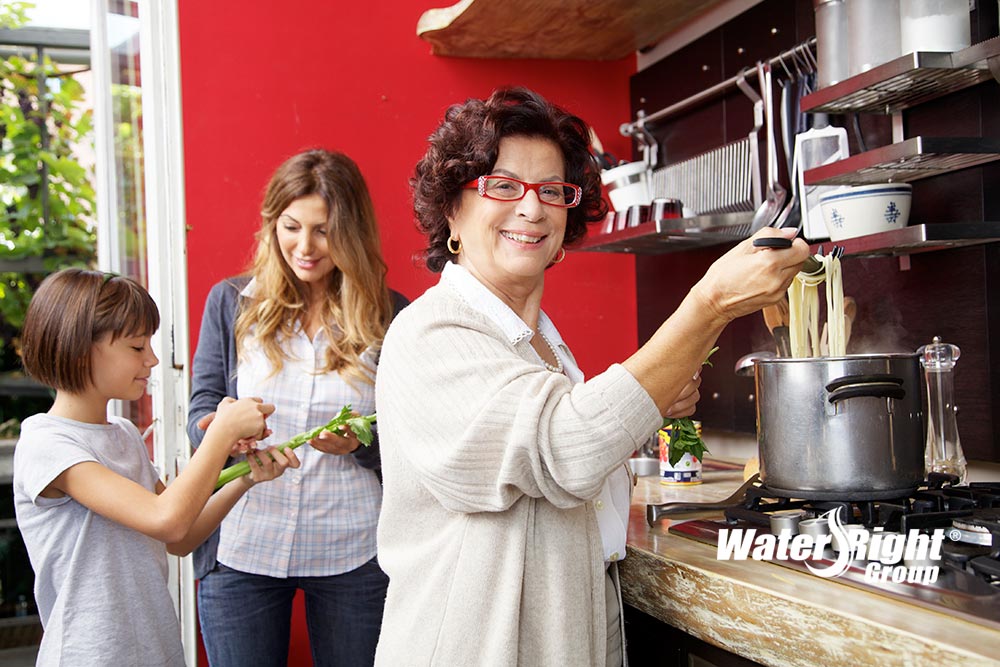
Is Hard Water Ruining Your Home-Cooked Meals?
You work hard to make food your family will enjoy, and you work even harder to create amazing meals for guests on holidays and other special occasions.
How would you feel if you knew one of the most basic ingredients you use when cooking and baking was negatively impacting the flavor of your food?
The truth is, the quality of your home’s water will have a profound effect on what you serve at the dining room table.
More than 80 percent of homes in the U.S. have hard water, which includes many homeowners with municipal water. Hard minerals like calcium and magnesium, as well as other things found in drinking water, can affect the flavor and color of food while making your job in the kitchen more difficult.
The Effect of Hard Water on Baking
Baking is an art. People who know how to pull perfect baked goods out of the oven are a cut above the rest. However, if you struggle with baking a beautiful cake, it could be your water’s fault.
Dissolved minerals in hard water can change the structure of gluten and also impact the performance of ingredients like yeast. Depending on how hard your water is, minerals can produce undesirable results such as dough that’s tough and rubbery.
Those hard minerals make it more difficult for proteins in the flour to absorb water. According to King Arthur Flour’s website, extremely hard water can slow down the fermentation process of yeast and cause a tightening effect.
The pH level of your water is another thing to consider. Hard water is more alkaline (higher pH), but most experts recommend slightly acidic water for baking. That’s because water with a pH level just below 7 helps yeast perform best.
The Effect of Hard Water on Cooking
Dissolved minerals in hard water can also affect the texture and appearance of food. If you boil or blanch certain vegetables in hard water, they may become tough and lose some of their color.
According to cooking blog The Peach Kitchen, hard water increases cooking time for things like beans, and others say rice that’s cooked in hard water tends to be harder.
Hard water takes longer to come to a boil because it actually increases the boiling point of water. That may not seem like a big deal, but when you’re in a hurry to make the kids some mac and cheese, most parents will take all the time they can get.
Chlorine that’s added to make city water safe to drink can also impact cooking. For one thing, you may be able to taste it in your food, but it could also have a “bleaching” effect and make vegetables cooked or steamed in tap water look dull.
Keep in mind, if you don’t like the flavor or odor of your tap water, it could be making its way into your food, too. When you cook dry food like rice, noodles, and beans, it may be absorbing that same flavor.
Choose the Right Water for Your Kitchen
One of the best ways to get water that’s ideal for cooking is to have a reverse osmosis system installed right underneath your kitchen sink. Reverse osmosis (RO) removes the vast majority of impurities from your water, leaving you with H2O that’s clean and refreshing.
RO water makes better coffee and tea while ensuring that you’re tasting the delicious ingredients of your soups, sauces, and gravies … not impurities from the tap water. RO water is also slightly acidic, making it a good choice for baking bread.
Fine Cooking points out that some of the best chefs in the world are big believers in using RO water to make their most famous recipes.
“When you are cooking, you will find that using reverse osmosis water from your system can have a great deal of an impact on the way that your foods taste. Using clean water will help you to make sure that everything you cook is free of impurities, whether you are boiling pasta, making a soup, creating a hot drink and more. It is no wonder that a lot of the best restaurants today are using RO water systems for all of their cooking.”
There are many benefits to using RO water, and getting a system for your home may be more affordable than you think.

